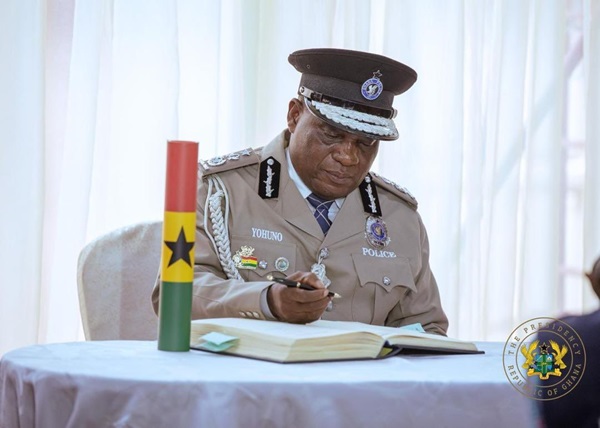In the high-stakes arena of public leadership, particularly at the helm of a critical institution like the Ghana Police Service, navigating public perception is as crucial as executing core duties.
Ghana is currently witnessing a fascinating, yet strategically profound, shift in this dynamic under the new Inspector General of Police, COP Christian Tetteh Yohuno. His quiet, deliberate approach stands in stark contrast to his predecessor, hinting at a nuanced understanding of leadership that could redefine public trust.
*The Dampare Era: Performance as Spectacle*
Immediate past IGP, Dr. George Akuffo Dampare, was undeniably a master of the moment. His tenure, from August 2021 to March 2025, was characterized by an almost ubiquitous personal presence in the media. Dr. Dampare often appeared directly at crime scenes, personally led operations, and engaged with the public and press under the full glare of cameras.
This high-visibility strategy certainly commanded immediate attention and, for many, projected an image of a decisive, hands-on leader committed to swift action.
It built a powerful personal brand for the IGP. However, relying heavily on a leader’s constant personal performance, no matter how impactful, carries inherent risks.
It can inadvertently shift public focus from systemic reforms to individual charisma, creating an expectation of perpetual spectacle that can overshadow substantive institutional change and raise questions about the long-term sustainability of such an approach.
*The Yohuno Doctrine: Action Over Optics – Building Enduring Trust*
Now, under COP Christian Tetteh Yohuno, Ghana’s Police Service appears to be embarking on a fundamentally different and arguably more strategically astute journey. His early days are marked by a deliberate pivot towards “action over optics” – a measured yet impactful focus on internal strengthening and systemic reforms rather than a chase for personal media limelight.
Yohuno’s strategic foresight is evident in moves like the reported lifting of prior media engagement restrictions within the service. This isn’t merely about “openness”; it’s a profound step towards decentralizing communication and empowering Public Affairs Officers across commands. It signals a commitment to fostering a more professional, consistent, and resilient communication apparatus that operates effectively, regardless of the IGP’s immediate personal presence.
The emerging narrative under Yohuno is one of substance over superficiality. His focus seems firmly on internal discipline, strategic policy implementation, and fortifying the foundational pillars of the Police Service.
The intent is clear: to let the tangible results of collective police work – genuine improvements in safety, stronger community bonds, and a more disciplined force – define public perception, rather than relying on the top cop’s personal charisma or daily appearances.
*The Strategic Imperative: Translating Quiet Power into Public Credibility*
COP Yohuno’s “action over optics” strategy is, in essence, a masterstroke. It prioritizes the hard, often unseen, work of building an institution that can inspire trust consistently, rather than relying on episodic public performances. It’s about cultivating enduring credibility that transcends any single personality.
However, even the most brilliant actions can remain unheard if their story isn’t strategically told. The challenge for IGP Yohuno and his team isn’t about shunning the media, but about mastering the narrative of his impactful, yet less visibly flamboyant, leadership.
How does one ensure that profound reforms, diligently implemented behind the scenes, are fully understood and appreciated by a public accustomed to immediate, personal media engagement?
This is where strategic communication becomes indispensable. It’s about proactively shaping the public’s understanding of a Police Service that is diligently working to transform itself, not just for today’s headlines, but for Ghana’s long-term security and stability.
*Seizing the Narrative: For a Legacy That Endures*
COP Christian Tetteh Yohuno is laying the groundwork for a truly transformative legacy built on systemic change and unwavering public trust. His quiet determination is truly commendable. To ensure this strategic brilliance resonates deeply and permanently with every Ghanaian, the next critical step is to strategically communicate this transformation.
The path is set for a Police Service that builds trust through sustained action. The challenge now is to ensure that Ghana truly sees, understands, and believes in the quiet power that is reshaping its security landscape.
Written by Raymond Ablorh,
Policy, Strategy & Communication







